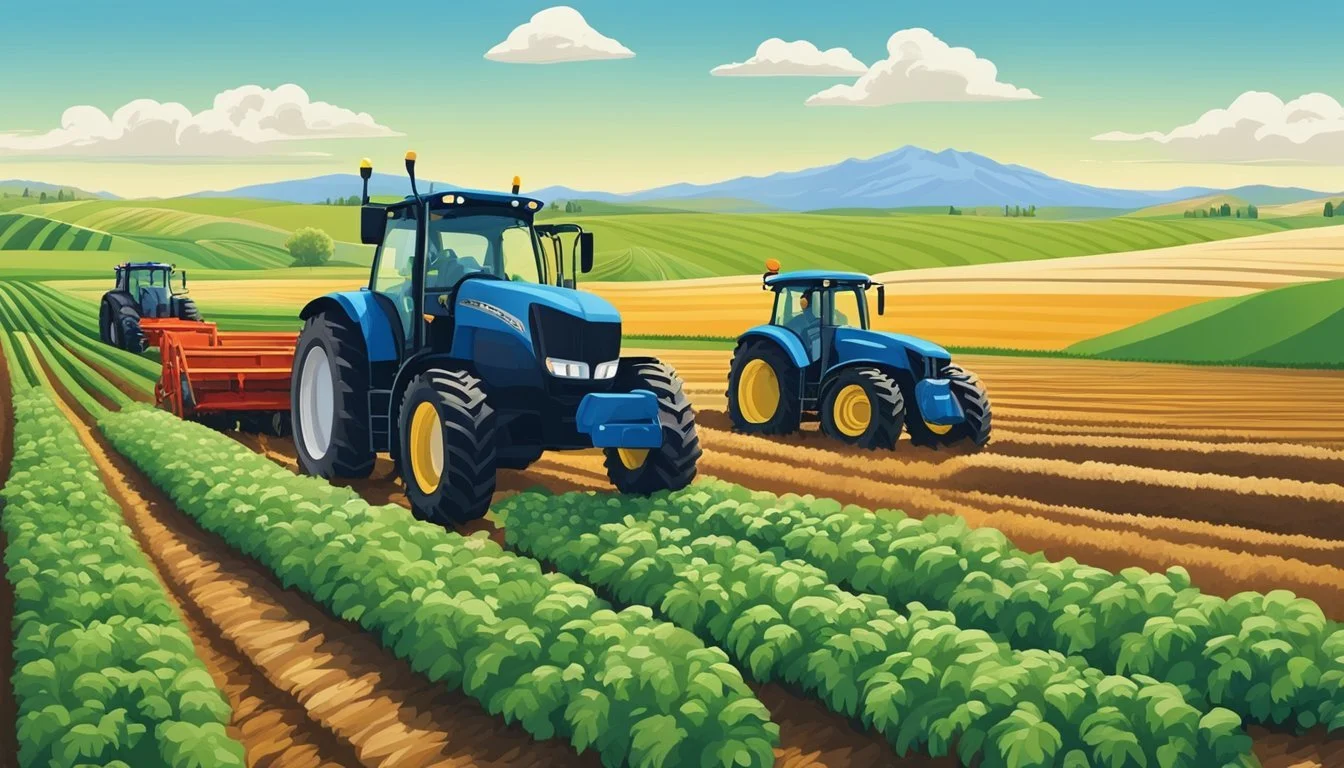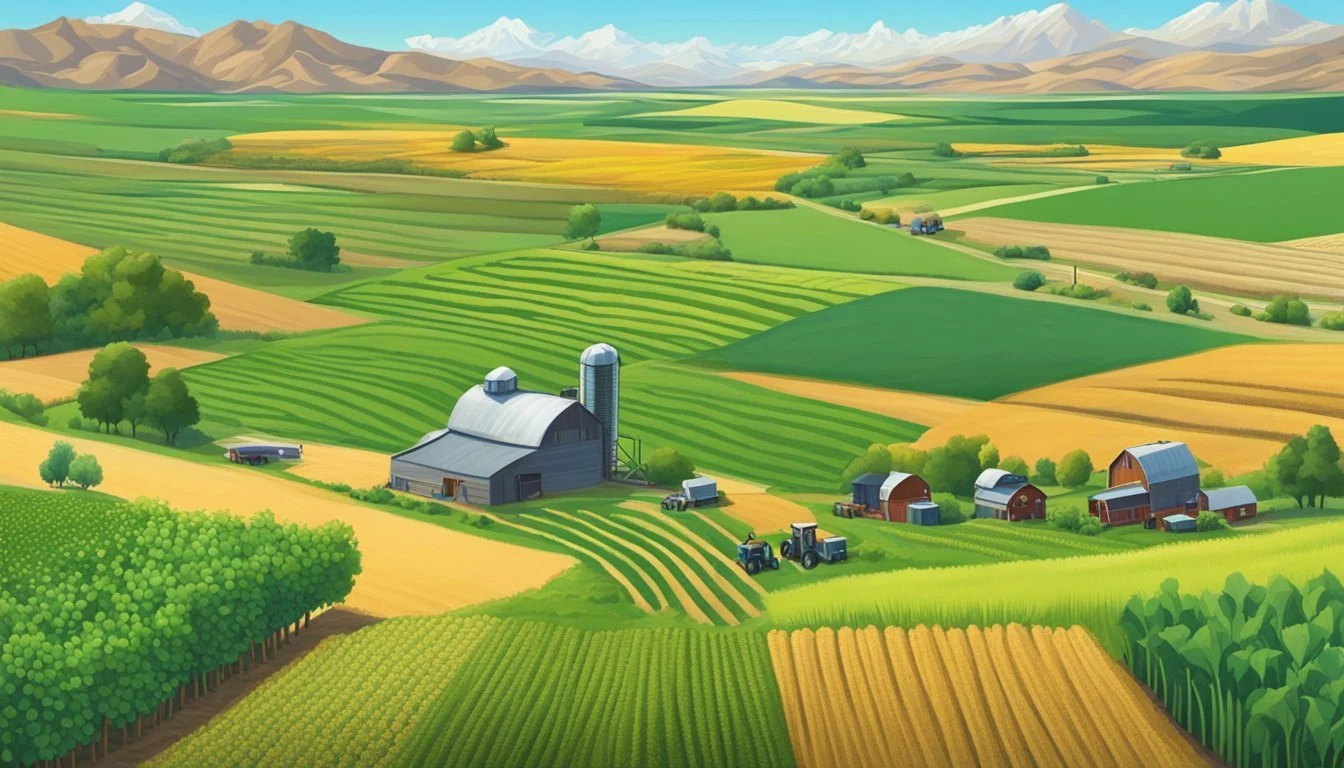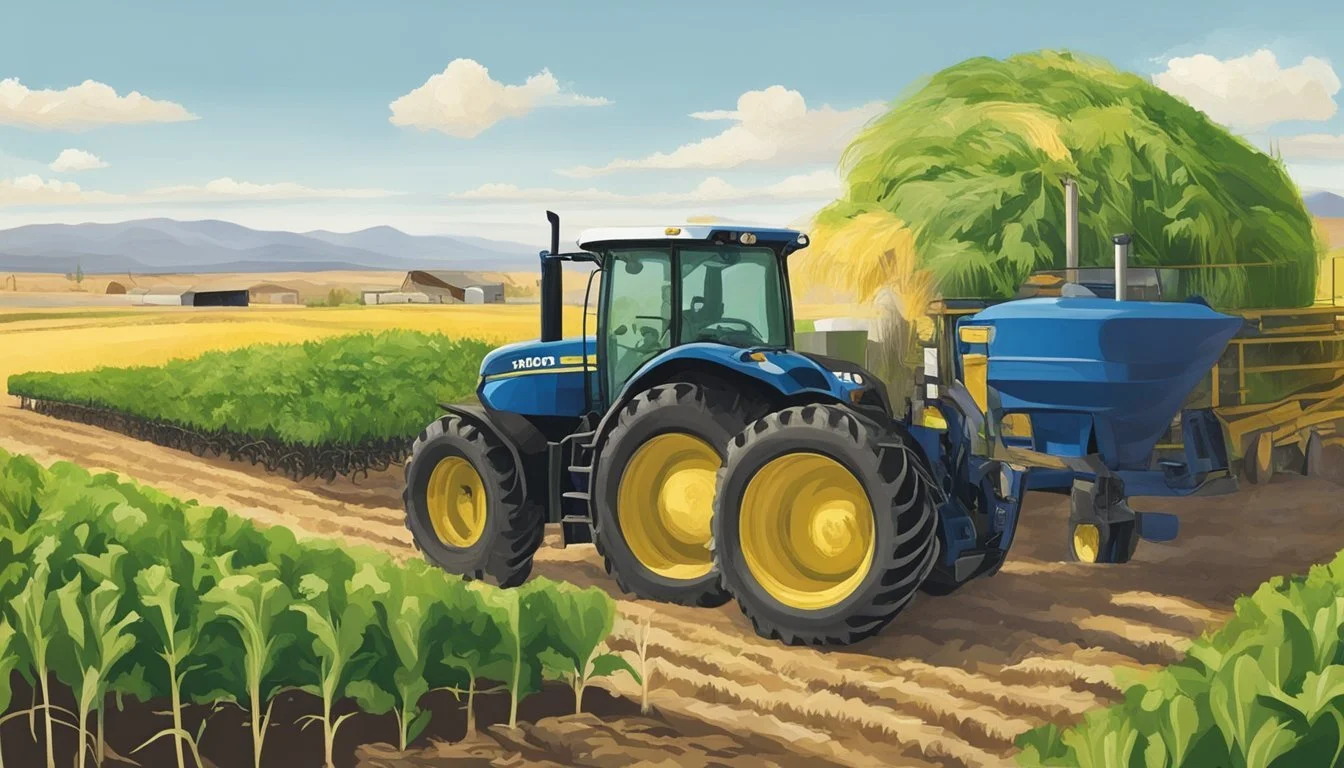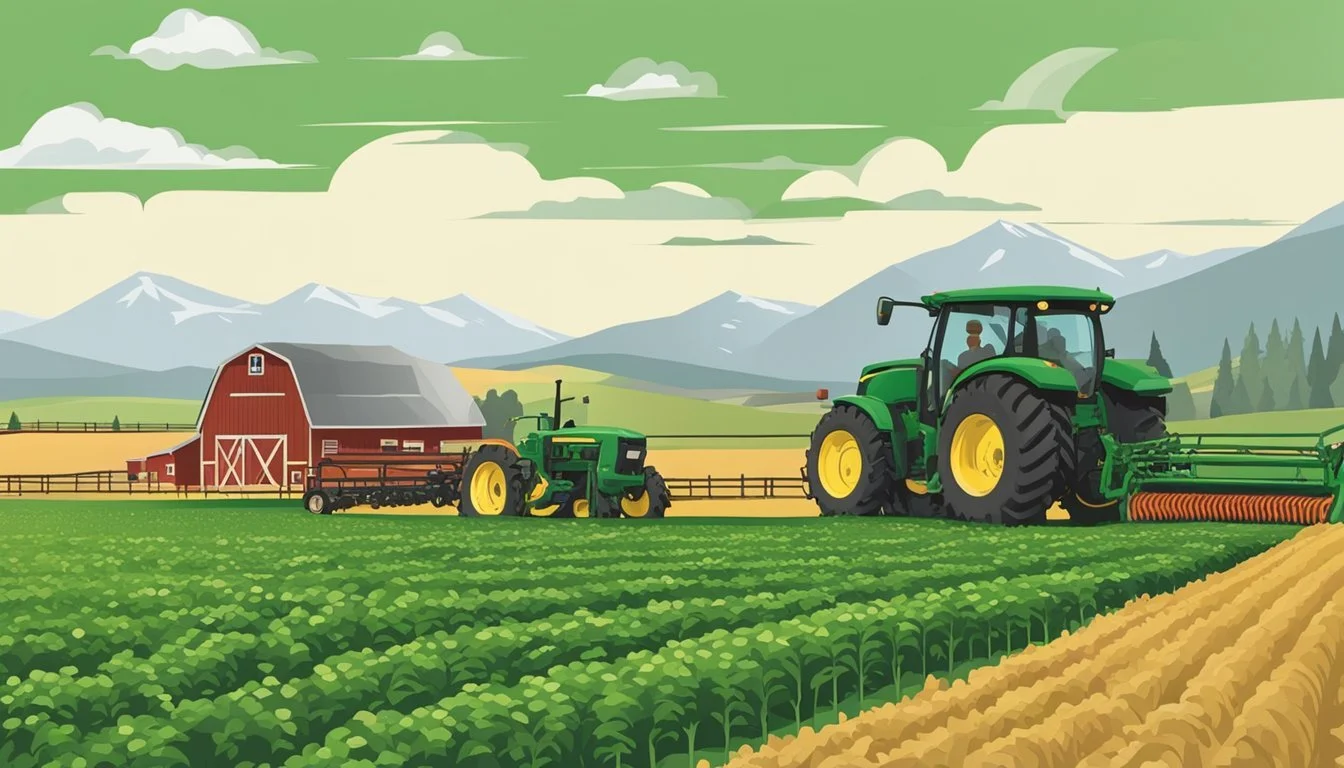Farming Grants Idaho
Navigating Opportunities for Local Agriculturists
In Idaho, agricultural enterprises have various avenues to secure financial support for their growth and innovation efforts. The state recognizes the significant role that agriculture plays in its economy and the importance of supporting this sector. Various grants are available targeting the expansion of Idaho's food product aggregation, processing, manufacturing, storage, transportation, wholesaling, and distribution.
The Idaho State Department of Agriculture (ISDA) is central to fostering agricultural development by providing Infrastructure Grants and Simplified Equipment-Only grants. These grants aim to enhance the efficiency and scale of operations for farmers and agricultural businesses within the state. Additionally, the Value Added Producer Grants give a financial boost to producers seeking to increase their revenue through diversification, value addition, and improved marketing strategies.
Resources are also available for individuals and businesses seeking to enter the agricultural industry or expand their current operations in Idaho. Through dedicated platforms, potential new farmers can access information on starting a farm, business planning, land acquisition, and the various funding resources available. EntityState-specific deadlines for application submissions ensure that interested parties are aware of their opportunities to apply for the available grants.
Understanding Farming Grants in Idaho
Farming grants in Idaho provide various opportunities for financial assistance to support agriculture. They cater to a diverse range of agricultural activities, from infrastructure development to market expansion.
Overview of Grants
In Idaho, farming grants are designed to support the agricultural industry by providing financial aid for specific projects and initiatives. Grants may include funding for infrastructure, equipment purchasing, manufacturing, storage, transportation, and distribution of food products. Unlike loans, grants do not require repayment, making them a valuable resource for farmers looking to expand or enhance their operations.
Eligibility for Grants
Eligibility criteria for these grants vary depending on the specific program and its goals. Generally, applicants must engage in agricultural production within Idaho. Certain grants may prioritize specific groups, such as beginning farmers or ranchers, as well as those introducing value-added products. Applicants typically need to demonstrate a robust business plan and a clear goal that aligns with the grant's objectives.
Types of Farming Grants
Idaho offers several types of farming grants, each targeting a different sector of the agricultural industry. Key grants include:
Infrastructure Grants: Financial assistance for the physical development necessary for agricultural activities.
Equipment-Only Grants: Funding focused solely on purchasing equipment rather than full-scale projects.
Value-Added Producer Grants (VAPG): These grants, managed by USDA Rural Development, help producers create new products and expand their market outreach.
Specialty Crop Block Grant Program: Aimed at enhancing the competitiveness of specialty crops.
Beginning Farmer Down Payment Loan: This type of loan from the Farm Service Agency aids new farmers in purchasing land.
By offering such diverse programs, Idaho supports the growth and sustainability of its agricultural sector through targeted financial assistance.
Plan Development for Grant Applications
Developing a robust plan is a critical step in successfully applying for farming grants in Idaho. It requires thorough research and detailed planning to present a compelling case for funding.
Creating a Business Plan
A farmer must craft a comprehensive business plan that outlines their agricultural operation. This plan should include:
Executive Summary: A brief overview of the farm, objectives, and how the grant will aid in achieving these goals.
Company Description: Details about the farm, including location, history, and types of farming activities.
Market Analysis: An evaluation of the local market, including competitors, potential customers, and market trends.
Organization and Management: Information on the farm's management structure.
Product Line: A description of the products produced and the developmental stage of the farming business.
Marketing and Sales: Marketing strategies and a sales plan.
Conducting Feasibility Studies
Before a farmer initiates the application process for grants, conducting feasibility studies is imperative to demonstrate the viability of the project. Key components include:
Objective Evaluation: Analysis of the project's goals, resources required, and potential challenges.
Financial Projections: Detailed current financial statements and future projections to assess economic feasibility.
Risk Analysis: An identification and assessment of potential risks and their impact on the project.
Incorporating these detailed assessments into a grant application can significantly enhance a farmer's chances of obtaining funding for their agricultural endeavors in Idaho.
Resources for Beginning Farmers and Ranchers
Beginning farmers and ranchers in Idaho have a variety of resources tailored to provide practical education, equipment access, and expert assistance. These resources are instrumental in helping newcomers establish and advance in the agricultural industry.
Education and Training Programs
Idaho offers several education and training opportunities designed to equip new entrants to the agricultural sector with the knowledge they need to succeed. Organizations provide articles, online resources, and training programs that delve into industry-specific topics. For example, the Land Conservation Assistance Network and Farm Answers are platforms where novices can learn about sustainable farming practices and business management.
Land Conservation Assistance Network: Provides a compilation of resources including articles and training programs.
Farm Answers: A hub for information on various farming subjects.
Access to Land and Equipment
Gaining access to land and the necessary equipment can pose significant hurdles for beginning farmers and ranchers. Idaho addresses this by connecting individuals with resources that help in the acquisition of land, and grants such as the Infrastructure Grants and Simplified Equipment-Only grants. These financial aids are made available through competitive solicitation processes to support the infrastructure crucial for food production and distribution.
Infrastructure Grants: Expand capacity for aggregation, processing, manufacturing, storage, transport, wholesaling, and distribution of Idaho food products.
Simplified Equipment-Only Grants: Provide financial assistance specifically for equipment purchase.
Technical Assistance and Support
Technical assistance is a cornerstone of successful farm and ranch operations. Newcomers have the opportunity to receive mentoring and support through programs like the Beginning Farmer and Rancher Development Program (BFRDP). This program provides grants to organizations delivering education, mentoring, and technical assistance.
Beginning Farmer and Rancher Development Program (BFRDP): Grants directed at organizations for education and technical assistance initiatives.
Agricultural Production and Management
Agriculture in Idaho is bolstered through a variety of support mechanisms designed to manage risk, enhance sustainability, and improve processing and marketing strategies. These initiatives are vital for agricultural producers seeking to maintain profitable farm operations.
Crop Insurance and Risk Management
Crop insurance plays a fundamental role in protecting Idaho agricultural producers from the unpredictable nature of farming. Risk management programs help shield farm operations from the financial impact of events like adverse weather, water scarcity, and changes in market conditions. For instance, the Environmental Quality Incentives Program (EQIP) supports farmers in dealing with resource concerns such as soil health and water quality.
Sustainable Farming Practices
Idaho promotes sustainable farming practices to ensure the long-term viability of agriculture and the health of the environment. Programs that focus on conservation, like the Sage Grouse Initiative, incentivize farmers to adopt practices that support wildlife habitats. These practices often increase competition for farm goods by appealing to consumers interested in environmentally-friendly products.
Processing and Marketing
Strengthening the capacity for processing and marketing Idaho food products is essential for expanding market opportunities. Infrastructure Grants and Simplified Equipment-Only grants are offered to enhance the aggregation, storage, processing, and distribution of local produce, which in turn helps producers to compete in a broader market and ensures the robustness of Idaho's agricultural economy.
Rural Development and Infrastructure
Rural Idaho benefits from various federal and state programs designed to promote community development through infrastructure upgrades and construction projects. These initiatives are instrumental in the sustainable growth and prosperity of Idaho's rural communities.
Building and Road Construction
For rural areas, the development of buildings and roads is crucial for connectivity and economic development. New construction efforts and improvements to existing structures can provide the necessary foundations for hospitals, schools, and libraries. Road construction is also essential, as it connects communities, facilitates the movement of goods and residents, and attracts businesses by improving access to remote areas.
Water and Utility Services
Utility services are the backbone of any community, and rural Idaho is no exception. Investments in water and waste treatment systems ensure that rural residents have access to safe drinking water and proper sanitation. This also includes the development of high-speed internet infrastructure, which is pivotal in bridging the digital divide and enabling rural communities to participate in the modern economy. Reliable utilities not only improve the quality of life but also support the growth and retainment of employment in these areas.
Outreach and Support Programs
The landscape for farming grants in Idaho is fortified by extensive outreach and collaborative efforts between local agencies. Leadership development and job creation are integral to these programs, reinforcing the agricultural sector's stability and growth.
Local Agencies Collaboration
Local agencies in Idaho actively collaborate to facilitate a variety of grant opportunities for the farming community. The Idaho State Department of Agriculture (ISDA) is key in this network, offering Infrastructure Grants and Simplified Equipment-Only grants. These are designed to support the expansion in areas like processing, manufacturing, and distribution of Idaho food products. The United States Department of Agriculture (USDA) also works in conjunction by providing funds to ISDA, which are then allocated as competitive grants to bolster supply chain resilience in Idaho's agricultural sector.
Programs and Collaborations:
Infrastructure Grants
Simplified Equipment-Only grants
Competitive grants through ISDA
These collaborations are crucial for enhancing the state's food and farm business infrastructure and fostering a robust supply chain.
Leadership and Job Opportunities
Idaho's agricultural grants extend beyond financial assistance, encompassing programs aimed at leadership development and job creation in the rural sector. Programs such as the Value-Added Producer Grant (VAPG) help agricultural producers with value-added activities, which can lead to new job roles and market expansion. Priority may be given to beginning farmers or ranchers, emphasizing the route to leadership in the industry.
Additionally, job opportunities and leadership development can be found through agencies like the Natural Resources Conservation Service (NRCS), which offers the Regional Conservation Partnership Program (RCPP)-EQIP. By applying to these programs, producers and landowners engage with conservation initiatives, resulting in potential job creation and honing of leadership skills.
Leadership and Job Creation Initiatives:
Value-Added Producer Grant (VAPG) program for new product development
RCPP-EQIP for conservation-focused employment opportunities
It's clear that Idaho values the growth of its agricultural community not only through financial support but also by fostering leadership and providing avenues for sustainable employment within the sector.
Advancing Farming Careers
In Idaho, where agriculture plays a critical role in the state economy, there are opportunities for farmers to grow their careers through continued education and conversion to organic farming. These efforts are supported by various grants and programs.
Continued Education
Idaho offers financial assistance and initiatives geared toward the education and enhancement of farmers' expertise. State Trade Expansion Program (STEP) grants are a noteworthy example, providing matching funds to help small business concerns engage in international trade. Additionally, educational resources such as BeginningFarmers.org supply comprehensive information on starting a farm, business planning, and funding resources which are integral for farmers looking to expand their knowledge and experience.
Resources for Education and Experience:
STEP Grants: For global trade education and experience.
BeginningFarmers.org: Offers guidance on farm startup and educational opportunities.
Conversion to Organic Farming
Organic farming is an area of growth within Idaho's agricultural sector. To aid in the conversion process, the Value Added Producer Grants (VAPG) program supports independent producers and agricultural businesses transitioning to organic practices. They focus on the following elements:
Technical Assistance: Provision of expert guidance in organic conversion.
Financial Support: Grants to offset the costs associated with organic certification and marketing.
The advancement of farming careers in Idaho not only contributes to the resilience and sustainability of the agricultural industry but also to the improvement of the environment and community health.
How to Start a Farm in Idaho
Starting a farm in Idaho requires careful planning, access to land, and an understanding of available resources for beginning farmers and ranchers. Aspiring agricultural entrepreneurs should first create a comprehensive business plan that outlines the operation, financial aspects, and goals.
Initial Steps:
Develop a business plan: This should include market analysis, crop and livestock plans, and operation size.
Seek advice: Contact local experts such as the University of Idaho Extension office for guidance.
Assess land availability: Search for arable land suitable for the intended agricultural activities.
Resources for Beginning Farmers:
Farm Answers: Provides articles, training programs, and resources specific to the agricultural industry.
Local Service Center: Connect with a USDA service center for personalized advice.
Access to Capital:
Farm Loans: Explore options like the USDA's Farm Service Agency (FSA) loans tailored for new farmers.
Grants: Consider the Value Added Producer Grants which support various farm structures, including family farms and cooperatives.
Key Considerations Description Land Acquisition Investigate public and private options for purchasing or leasing farmable land in Idaho. Financial Assistance Utilize grant programs and loans designed to help start and expand farm operations. Educational Resources Leverage training programs offered by state and local agricultural organizations.
Farmers in Idaho also benefit from infrastructure grants provided by the Idaho State Department of Agriculture (ISDA) to support the food product distribution chain. Establishing a farm in Idaho demands dedication and an in-depth understanding of the resources available to turn the farming dream into a viable reality.









